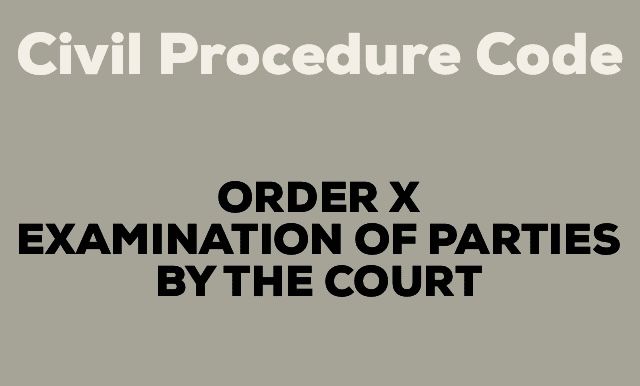 Order 10 CPC: Examination of Parties by Court
Order 10 CPC: Examination of Parties by Court
Order 10 of the Code of Civil Procedure, 1908 (CPC) deals with the examination of parties by the court. The main purpose is to ascertain whether the allegations made in the pleadings are admitted or denied, and to clarify the real controversy between the parties before framing the issues.
This provision plays a crucial role in reducing unnecessary litigation by:
• Bringing clarity on admissions and denials.
• Encouraging Alternative Dispute Resolution (ADR) under Section 89 CPC.
• Saving judicial time by identifying disputes at an early stage.
🔹 First Hearing of the Suit
The first hearing means the day when the court applies its mind to the pleadings of the parties to understand their contentions for the purpose of framing issues.
Case Law: Siraj Ahmad v. Premnath (1993 SC)
🔹 Rule 1: Ascertainment of Admissions or Denials
At the first hearing, the court shall orally examine the parties (or their pleaders) to know whether they admit or deny the allegations in the pleadings.
• If pleadings are clear (properly traversed), the court need not invoke this rule.
• If pleadings are vague, the court can examine the parties to record admissions or denials.
Kapil Corepacks (P) Ltd. v. Harbans Lal (2010 SC)
The Supreme Court held that Order 10 Rule 1 CPC is necessary only where the pleadings lack clarity in admissions and denials.
🔹 Rules 1A to 1C: ADR Provisions
Inserted by the 2002 Amendment, these rules integrate Alternative Dispute Resolution (ADR) into CPC through Section 89.
Rule 1A – Direction for ADR
After recording admissions and denials, the court directs the parties to opt for one ADR method:
• Arbitration
• Mediation
• Lok Adalat
• Judicial Settlement
Rule 1B – Appearance Before ADR Forum
Parties are bound to appear before the ADR authority once the court refers the matter.
Rule 1C – If Conciliation Fails
If the ADR authority feels settlement is not possible, the matter is referred back to the court for trial.
Step-by-step Process:
1. Court records admissions & denials (Rule 1).
2. Court directs parties to choose ADR (Rule 1A).
3. Parties appear before ADR forum (Rule 1B).
• If settled → decree passed.
• If not settled → referred back to court (Rule 1C).
4. Court resumes trial.
🔹 Rule 2: Oral Examination of Party
• The court may orally examine any party or any person accompanying them to clarify matters in controversy.
• This rule is broader than Rule 1 as it is not confined to admissions or denials.
• It can be invoked at any stage of the hearing.
• Not conducted on oath and is not a substitute for cross-examination.
🔹 Rule 3: Substance of Examination
The judge must reduce the examination into writing and it shall form part of the record.
🔹 Rule 4: Consequence of Refusal to Answer
If a pleader or party refuses or is unable to answer material questions:
• Court may adjourn the hearing (max 7 days) and direct the party to appear personally.
• If the party still fails to appear, the court may pass judgment against them or take other suitable action.
🔹 Section 89 CPC and ADR
Purpose of Section 89 CPC
Introduced in 1999 to reduce judicial backlog by encouraging settlement outside court.
Modes of ADR under Section 89:
• Arbitration
• Conciliation / Mediation
• Lok Adalat
• Judicial Settlement
🔹 Landmark Case: Afcons Infrastructure Ltd. v. Cherian Varkey Construction Co. (2010 SC)
The Supreme Court clarified the interpretation of Section 89 CPC:
• Judges are not required to draft settlement terms before referring cases to ADR.
• Courts only need to identify if the case is suitable for ADR.
• Referral to ADR is mandatory for the court to consider, but not mandatory in unsuitable cases.
Cases Suitable for ADR
• Commercial & contractual disputes.
• Matrimonial & family matters.
• Landlord-tenant & partnership disputes.
• Consumer disputes.
Cases Not Suitable for ADR
• Representative suits (Order 1 Rule 8 CPC).
• Election disputes.
• Probate & administration cases.
• Fraud, forgery, coercion-related cases.
🔹 Mediation Act 2023 and Section 89
The Mediation Act, 2023 amended Section 89 CPC by:
• Removing the requirement for courts to draft settlement terms.
• Aligning ADR terminology properly.
• Bringing law in line with Afcons judgment.
🔹 Conclusion
Order 10 CPC ensures that before the trial begins, the court clarifies what is admitted and denied, and explores the possibility of settlement through ADR under Section 89 CPC.
• If settlement succeeds → decree is passed.
• If it fails → trial resumes.
This system reduces unnecessary litigation, saves judicial time, and encourages amicable resolution of disputes.
✓ In short, Order 10 CPC is not just about framing issues but about promoting speedy justice through ADR.
∆ To start your preparation for Judicial Services Examination at home, drop a message on WhatsApp +91 8840961324 or call us on +91 9151591324
At Theory of Abrogation, we equip you with everything you need:
•Subject-wise expert classes
•Mock test series
•Legal current affairs
•Personalized mentorship for interview preparation
“Your law degree is your foundation, but your preparation is what will build your success.”
Join Our New Batch Now!
Prepare smart. Prepare with Theory of Abrogation.
Contact Us:
B-109, Commercial
Complex Dr. Mukherjee
Nagar, Delhi-09
+91 9971399324 | +91 8840961324
[email protected]
